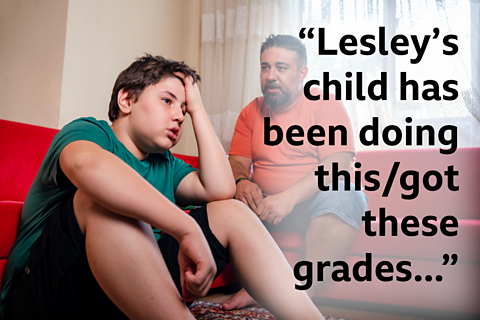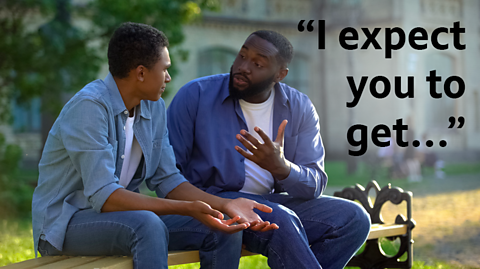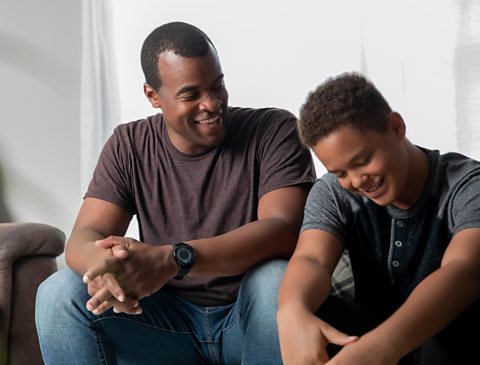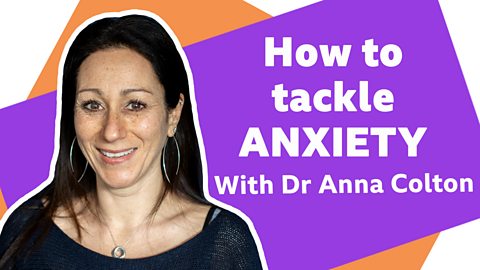It’s exam season. Your kids are stressed. You’re stressed. And no matter what you say to try and help, it always seems to end in a huge row.
You’re only trying to be supportive, but perhaps without knowing it, certain phrases and questions can actually be less helpful than you’d think.
We spoke to former head of psychology at Glasgow Caledonian University, Cynthia McVey, to walk us through some of these examples, and provide alternatives if you’re feeling at a loss.


“Don’t worry, you’ll be fine”
On the face of it, this could seem like quite a reassuring thing to say. In the grand scheme of things, they probably will be fine after all.
The thing is though, as Dr McVey says, it just doesn’t mean anything: “What does that mean? Will they be fine because they’ll pass everything or does it mean they’ll be fine whatever happens?
“99.9% of children are going to worry anyway… it’s quite a nerve wracking thing for them”.
Her advice is to acknowledge that it’s stressful, but they can only do their best, and that’s enough.


“The bar is set much lower these days - exams were much harder when I was at school.”
“Eurgh.” That pretty much sums up Dr McVey’s response.
The long version is that it’s just not the case, and even if they’ve heard it from other people, they shouldn’t have to hear it from you.
The best thing to say according to her is: “Your exams are challenging you in the same way as exams have always challenged people.”


"Shouldn’t you be revising?”
It’s normal to be concerned about your child’s success, and to be curious as to how they’re doing, but this probably isn’t the best way to do it.
Dr McVey’s advice is to offer help at the start of the process, but not to force it upon them: “Ask them instead: ‘Do you have a plan?’ and then ask if you can help with it.”
She also suggested offering to create a quiet space in the house or, if there isn’t room for one, suggesting you take them to the library. But, if they refuse your help, don’t insist!
The key according to Dr MvVey is: “Treat them as adults… say: ‘You’re grown up now. You can take responsibility, and we can help you in any way you want us to.”


“It’ll all be over soon”
This one’s a bit tricky: “If you have a child who’s very anxious, it’s not a bad thing to say it’s a short period, we’ve got a holiday coming up… but some children might panic and think they’re short of time.”
So, a bit of a minefield then. Dr McVey’s advice is to use your own judgement as to what your child’s nature is, and what they’ll need as a result of that.


“Are you sure that’s the best way to revise?”
Are you sure you want to start a massive argument?
Dr McVey says that your kid needs to be the one in charge: “It’s often better if it’s directed by the children themselves… We might revise differently to them.”
A good example is with music - you might think that they can’t possibly be getting anything done if their speakers are blasting at full volume, but as Dr Alex explains too, for some kids it can really help their learning.
Finally, she said: “Leave them to it, and trust that the school has prepared them and showed them how to revise.”
There's lots of advice for students on studying, revising and sitting exams from BBC Bitesize.


“Lesley’s child has been doing this/got these grades when they did their exams.”
How often should you say this according to Dr McVey? “Never.”
Wanting to say it is of course understandable, as “it’s frustrating for parents when their children do not perform to the best of their ability.”
But comparing them with other kids will only make them feel unsupported and judged, and to be honest, it’s probably something that’s crossed their minds already: “Chances are high that they will know about the performance of other children around them.” So just don’t do it, basically.


“I expect you to get…”
“No, no, no!”
Clearly, Dr McVey thinks laying expectations at your child’s feet isn’t necessarily the best approach. How well your teenager performs is up to them, and you can’t force them to see it from your point of view.
Besides, she said sometimes disappointment can be a good thing: “They’ve learned something as a result of failure - I don’t really like that word but it will all be a learning experience if you don’t do as well as you’d like.”
Her advice? If they’re not necessarily exam-minded people, then they “need to find careers where their character and brightness and alertness and other great qualities can shine through… to each their own.”


“You’ll regret it if you don’t put any effort in!”
“It’s true, but I don’t think you can say it!”
Dr McVey’s advice is that “you can’t put an old head on young shoulders” - in other words, you can’t expect the truth of this to be useful to someone who hasn’t been through it yet.
Instead, “all you can do is say I know you’ll want to do the best you can… that’s much more productive.”


What about what’s helpful?
Dr McVey says it’s all about being supportive, gently reminding them to schedule time for rest as well as work, but always letting them take the lead.
But how about after their exams? If they don’t do as well as they thought they would, make sure to “kindly manage their distress” and remind them that there’s “always the opportunity to do them next year.”
Life lessons in delayed gratification are no bad thing, so if they do have to resit, all that needs to be said is: “Enjoy your summer, take a deep breath and do them again.”
This article was published in 2019

More from BBC Bitesize Parents' Toolkit…
Parents' Toolkit
Fun activities, real-life stories, wellbeing support and loads of helpful advice - we're here for you and your child.

How to tackle anxiety with Dr Anna
Calming techniques to help parents and children manage their anxiety.

How to revise away from your desk
You don't have to be chained to your bedroom when getting that study done.

Five ways to help your kids kick-start revision
If you're a parent, how you can support your teenager this exam season?

Five ways to motivate your teen to study at home
Getting teens motivated to study can be difficult. Natasha Devon provides some tips on how you can support your child.

Mental health first aid kit for parents: Who to ask and what to do
Worried that your child needs help with their mental health? Here's how you can access professional help and support your child while you wait.

